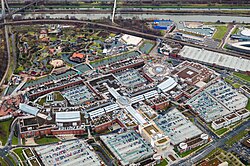Large-scale retail
Large-scale retail is a term used in urban planning and especially in German building law . It separates large-scale retail operations from other trade .
to form

Retail businesses are businesses that sell exclusively or mainly to end consumers . These include a. all purchase and department stores , hypermarkets , self-service department stores , supermarkets and specialty stores . This also includes direct sales to end consumers, regardless of whether this takes place at the location of the manufacturing plant or in a specially created factory outlet center . Shopping centers occupy a special position .
A shopping center is understood to be either a uniformly planned or through successive neighborhood formation (actual shopping center) a spatial concentration of retail businesses of various types and sizes, which mostly occur in combination with different types of service providers .
Actual shopping centers emerge from a concentration of retail operations that only emerged over time, which for the customers are systematically combined and not just appear as a random accumulation. According to the case law, a certain size, a common concept or cooperation, common advertising or naming as well as a suction and magnetic effect are required to be able to speak of a shopping center.
definition
The Building Utilization Ordinance regulates when a retail business is to be classified as large-scale ( Section 11 (3 ) BauNVO ). According to this, a retail business is large if it exceeds a floor area of 1200 m². In its ruling of November 24, 2005, the Federal Administrative Court also stated that retail businesses (only) are large areas within the meaning of Section 11 Paragraph 3 Sentence 1 No. 2 BauNVO if they exceed a sales area of 800 m². Previously, the large area was assumed to be from approx. 700 m² sales area. In these cases, the legislator regularly assumes that the operation has negative effects on urban development and order and on the implementation of the objectives of spatial planning, with the legal consequence that operation is only permitted in certain building areas (core areas, certain special areas according to § 11 para. 3 BauNVO ). This presumption can be refuted by an expert opinion if there are concrete indications such as B. the range of goods suggest the assumption of an atypical form of business (rebuttable rule presumption).
criticism
This differentiation in German building law is seen by the operators of food supermarkets as a disadvantage compared to the operators of food discounters . While discounters can open profitable branches with a sales area of 800 m² due to their limited range and the special features of this type of business, supermarkets are regularly dependent on larger sales areas (often over 1000 m²) in order to offer the full range of foods typical of this type of business. However, with this size, the supermarkets fall into the building law category of large-scale retail operations and are therefore subject to much more restrictive building law. The result is that the supermarkets, as large-scale retail operations, can only be set up in core areas and special special areas, while the discounters are also permitted in other areas.
swell
Individual evidence
- ↑ BVerwG, judgment of November 24, 2005 , Az. 4 C 8.05, full text.